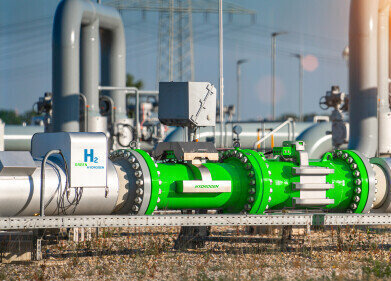Sustainable aviation fuel (SAF)
Sustainable Jet Fuel is One Step Closer
Jun 28 2020
Following 15 years of development, carbon recycling pioneer LanzaTech has launched a new company focusing exclusively on the production of sustainable aviation fuel (SAF). After securing around US$85 million in funding from high-profile investors such as Suncor, Mitsui and All Nippon Airways (ANA), LanzaJet is planning to introduce SAF as a safe and affordable option for the commercial market.
As well as Canadian oil and gas producer Suncor Energy, LanzaJet has garnered support from Japanese general trading company Mitsui & Co. and Star Alliance airline, All Nippon Airways. “We believe that this partnership is a great step forward for carbon-neutral growth initiatives,” says ANA executive vice president Akihiko Miura.
Prototype plant set to produce SAF by 2022
The first cash injection will be used to construct a prototype plant with the capacity to produce 10 million gallons of SAF and renewable diesel every year. The fuels will be produced using sustainable ethanol sources, with LanzaTech CEO Jennifer Holmgren saying the technology has the potential to slash greenhouse gas emissions within the aviation sector. The prototype plant is scheduled for completion by 2022, with SAF production set to begin shortly after.
“We finished the investment side and the off-take agreements and that’s all committed,” says Holmgren. “Now we’re working on getting the feedstock… We’re making sure that we can source low-carbon intensity ethanol.”
Leveraging emissions capture technologies
Holmgren has confirmed LanzaJet will be working closely with renewable energy standards authorities to source ethanol with eco-friendly credentials. While feedstock will initially come from third parties, eventually LanzaTech hopes to provide ethanol using its own emissions capture technologies. Used at power plants and other carbon heavy sources, the in-house methods actively capture emissions and stores them in tanks filled with special microbes. These microbes then convert the emissions into ethanol which can be used to produce SAF.
Championing “bio-based, low-carbon fuels”
For Suncor, the project is an exciting opportunity to diversify its focus in the Canadian oil sands region and explore environmentally conscious energy solutions. Already, the company has started to install EV charge stations across its Canadian gas station network. According to Suncor CEO Mark Little, “while Canadian oil and gas will remain a significant part of the global energy mix for some time, we have to take advantage of new opportunities that offer attractive growth prospects.” Vice president of strategy and corporate development Andrea Ducore agrees, saying “we’re taking a view towards how do we think the energy transition is going to progress” and citing “bio-based, low-carbon fuels” as a potential solution.
Carbon capture technologies are at the heart of the climate change action movement, with companies such as LanzaTech spearheading the charge. To find out more about the concept don’t miss ‘An international standard for CO2 purity could support safe and efficient CCS operations’ with insight from Stephen B. Harrison on behalf of sbh4 GmbH.
Digital Edition
PIN 26.1 Feb/Mar 2025
March 2025
Analytical Instrumentation - Elemental Analysis for Quality and Process Control at Refineries, for Lubricants and Wear Metals in Engine Oils - Synthetic Lubricants: New Developments - Scaling...
View all digital editions
Events
Apr 08 2025 Birmingham, UK
Apr 08 2025 Kielce, Poland
Apr 08 2025 Ravenna, Italy
Apr 08 2025 Southampton, UK
Apr 08 2025 London, UK



















